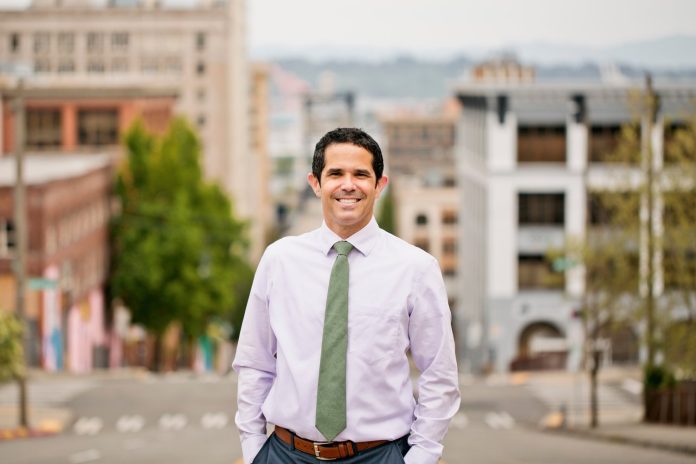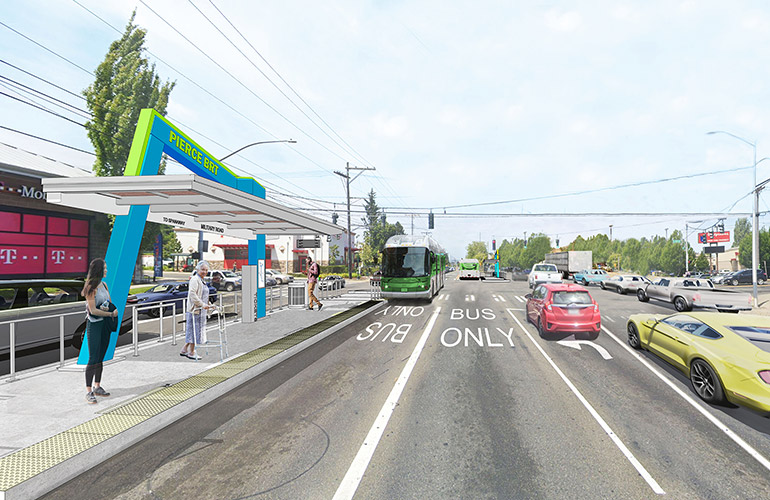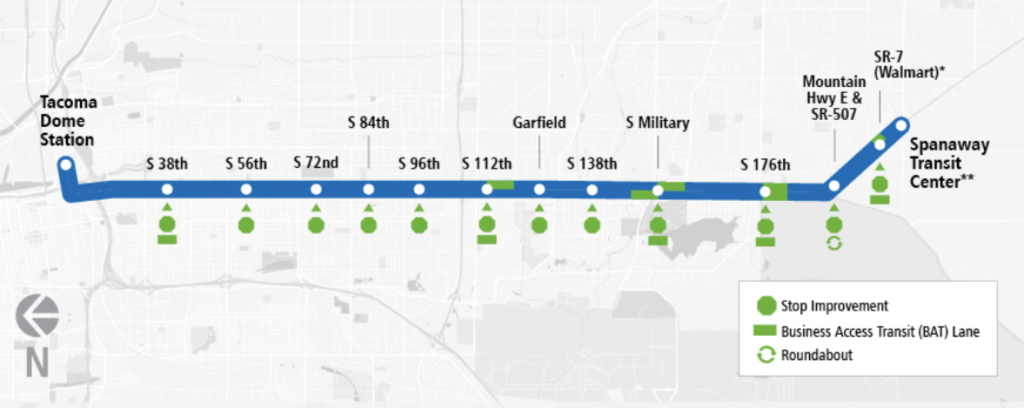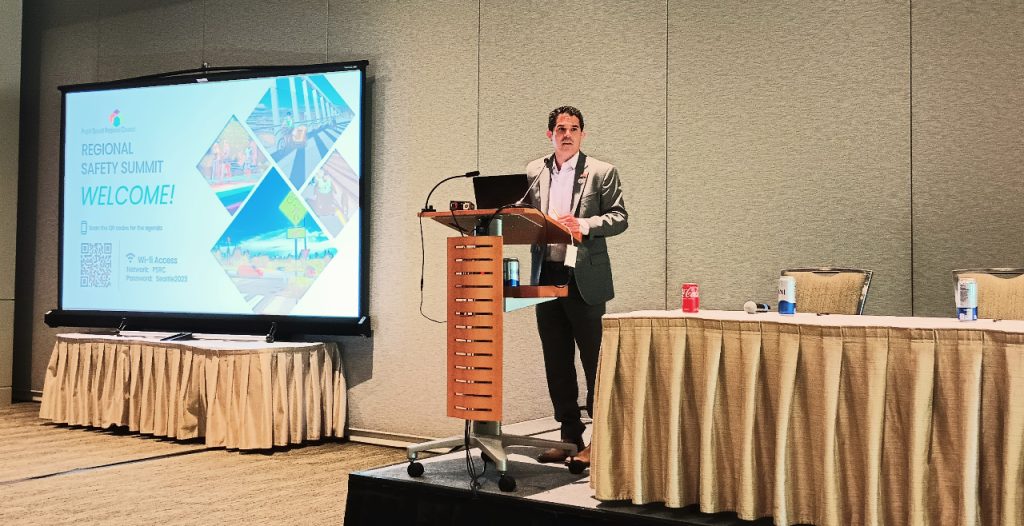
A vocal critic of highway expansion, Mello’s urbanist vision includes “parks and open space trails, a good transportation network, safe places to walk and bike.”
After eight years of Republican control of the Pierce County Executive’s office, Democrat Ryan Mello is running to be the one to lead Washington’s second largest county. With 13 years of experience in elected office and currently serving as the chair of the Pierce County Council, Mello is aiming to bring an increased culture of collaboration that would likely represent a stark contrast compared to current Executive Bruce Dammeier’s often adversarial relationship with the County Council.
With a long history of advocating around environmental stewardship and smart planning, Mello is putting climate change and environmental conservation front and center in his campaign, which was officially launched in mid-December. For nine years, Mello worked as executive director at the Pierce Conservation District, implementing best practices around conservation and water quality and growing the budget of the non-regulatory body from a staff of nine to 32 people, and more than doubling the district’s budget.
After serving as the first openly gay man on the Tacoma City Council from 2010 to 2019, Mello made the jump to the County Council in 2020 as part of a progressive majority that often ran up against Dammeier as Executive. In the face of vetoes from Dammeier on everything from the creation of a county equity commission, a veto Mello came out in strong opposition to, to the creation of safe parking lots for those experiencing homelessness while living in their cars, to a modified flag policy that would have allowed the County to fly the pride flag for the first time, the County Council has been able to advance its priorities even as it wasn’t able to override those vetoes. Among its priorities has been work to create the County’s first Vision Zero action plan.
One of the Council’s biggest accomplishments during Mello’s tenure has the approval of a 0.1% sales tax last March to fund housing and services for people experiencing, or who are at risk of experiencing, homelessness. Prior to the passage of this new fund source, Pierce County had very few dedicated funding streams like it, and now around $20 million will be generated every year to fund those needed programs.
With Dammeier prohibited from seeking a third term due to term limits, Mello is set to go up against current Republican State Representative Kelly Chambers (25th District, Puyallup) this year, in a race that is sure to represent two very different visions for Pierce County.
Mello recently sat down with The Urbanist for an interview, in which he talked about his top priorities around growth, housing, and transit.
Investing in Transit
On the Pierce Transit board, Mello has had a front row seat to the transit agency’s inability to move forward on Pierce County’s first bus rapid transit line, connecting downtown Tacoma with Spanaway via Pacific Avenue. Design elements that the City of Tacoma, and the Washington State Department of Transportation (WSDOT), wanted included in the project, including new roundabouts and a significant amount of property acquisition to avoid impacts to general purpose traffic, ultimately put the project’s costs into the realm of the unachievable.

Last year, as the project was collapsing, Mello expressed frustration with the existing incentives that had converged to make keeping transit slow along Pacific Avenue the easiest option.
“We we keep getting into these self-fulfilling prophecies and not prioritizing making transit, convenient, accessible, the preferred option, because it’s highly convenient and accessible,” Mello said at the time. “We are making it less convenient, and not the competitive choice: competitive by time savings, of course, and attractiveness and comfort. We have to do a lot more for it to be the preferred option. And right now, we’re just not hitting the mark.”
But Mello sees the scaled-back “enhanced bus” running between Tacoma Dome and Spanaway as providing a big benefit for riders, and provide a demonstration project that will lead to demand for more transit projects across the county. Ultimately, the enhanced bus service will function more like an express option for travelers looking to get from one end of the corridor to the other. “It’s not going to have all the elements that the community deserves for high-capacity transit… we need a lot more features to make that transit service quicker, more frequent, safer, more comfortable,” he said.

“I think it’s going to really show folks — you’re still going to see some noticeable travel-time savings, and we’re going to build on that. And so I’m excited to show that to folks,” Mello said. “So when when they can see that, they’re going to be able to understand what’s possible when we can really deliver a full blown bus rapid transit line there, and then take that kind of success to future lines.”
One of the most significant roles that the Pierce County Executive plays is on the Sound Transit board, where they get a vote directly on issues that impact the entire region’s growing high capacity transit system, but also decide who to appoint for the other seats representing Pierce County. During his time on the board, Dammeier has spent a significant amount of energy focusing on fare evasion rates at the agency, while at the same time deferring to other board members when it comes to decisions that may impact how transit riders use the system years in the future.
But ultimately, expanding local transit service within Pierce County will likely prove to be Mello’s biggest challenge in the years ahead. Among Central Puget Sound’s large transit agencies, Pierce Transit is currently authorized to collect one of the lowest sales tax rates for transit, at just 0.6%. Compare that to 0.9% for King County Metro (with an additional sales tax in the City of Seattle), 1.1% for Kitsap Transit, and 1.2% for Community Transit.
Yet ever since 2012, when a 0.3% increase to Pierce Transit’s taxing authority was narrowly rejected by only around 1,000 votes on the same ballot that Pierce County voters also rejected same-sex marriage, Pierce Transit has significantly lagged behind its peer agencies in delivering needed service. Mello said he was hopeful that the voters would be ready to say they’re ready to expand transit service in Pierce County.
“I certainly hope so. You know, we’ve been working hard on building relationships with many communities, many stakeholders, non-traditional stakeholders, traditional stakeholders, you know, we’ve been working really hard explaining the various services of Pierce Transit, talking about our vision for the future, what additional resources could mean for better span of service, more frequent service, and helping the community vision that,” Mello said. “There’s a hunger for it. So we’ve been out telling that story about what’s possible, if we got more resources to translate into more and better service.”
Shepherding Pierce County’s Growth
The number of people who live in unincorporated Pierce County, outside the boundaries of a city or town, is approaching 450,000 — more than double the population of Tacoma and more people than live in all but five of Washington’s 39 counties. Pierce County’s leaders have the ability to direct an immense amount of the state’s growth over the coming decades, either toward more sprawl, or toward a more sustainable model that maximizes investments in transit and sustainable communities.
This year, the County Council will play a huge role in determining the parameters of growth within unincorporated Pierce County, and Mello’s vision is one where not everyone needs a car to be able to live a prosperous life.
“We need to update our plan to be more transit focused, to be more transit friendly. So making sure that as we grow, we don’t put more people hours away from their job,” Mello said. “We need to make sure we don’t build communities that force people into more gridlock and force people into sitting in their car for hours of their day. That’s not what people want. That’s not a high quality of life. And so we need to be incredibly mindful as we continue to plan for the future, that we are not doing that, and instead, we are building communities where people can the more healthy lives, perhaps walk and bike more, get access to transit.”
“My vision for Pierce County is that we have a place that everyone is really proud to call home, and a place where folks can have a great job and have a safe neighborhood and a really great neighborhood,” Mello said. “That means having all the elements that makes a community when you’re proud to call home: parks and open space trails, a good transportation network, safe places to walk and bike, [to] be with your family.”
Mello wants to see the county incentivize Pierce County’s incorporated cities to grow more dense to be able to take advantage of investments in transit. “The future is having our cities, especially our core cities, Puyallup and Lakewood, Sumner and Gig Harbor, take more growth in a responsible way,” he said. “And metropolitan cities like the City of Tacoma, continue to take more growth in a responsible way while maintaining a really high quality of life for everybody.”
Advancing Local Goals at the Regional Level

Mello has been very active in working with other levels of government across the state to move toward a shared vision and in particular, through working with the Puget Sound Regional Council (PSRC), has tried to advance priorities on a regional level. Mello serves as vice chair of PSRC’s Transportation Policy Board, where he has been one of Central Puget Sound’s biggest critics of highway expansion. On the County Council, Mello advocated against funding the widening of Canyon Road, an expansion project that has been on the books in Pierce County for decades and is still treated by many as inevitable.
Mello described how he pushes back on conventional wisdom that still sees roadway expansion as aligned with best practices, despite the evidence that shows adding lanes and extending highways isn’t moving the region or the state in the right direction.
“I try to show them pictures of Los Angeles or Arizona that visually show them quite literally that wider highways do not get you out of traffic, they actually make you sit in more traffic. So what some people think is the solution is actually perpetuating the problem,” Mello said. “I know that some folks have ingrained that wider and more highways get you out of traffic, but, let me show you that data where it actually puts you in more traffic, it makes your life more miserable.”
Earlier this year, Mello took a lonely vote ahead of the PSRC adopting criteria in advance of handing out federal grants that total hundreds of millions of dollars. The idea he was promoting? To prohibit transportation projects that would expand the region’s limited access highway network from being able to compete against badly needed safety and transit projects, setting a bar that meant only projects aligned with the region’s transportation goals would be able to get a bite at the apple. Projects wouldn’t be barred from being funded, they just couldn’t compete for scarce dollars. In the end, nearly every elected official on PSRC’s transportation policy board voted against the idea, illustrating just how hard it is to move the region as a whole off the status quo, particularly when it comes to how transportation projects are funded.
Ultimately, that vote illustrated just how prepared Mello is to stand by what he believes in, on a regional stage where it would have been very easy to go along with the majority. That clear vision makes him stand out among leaders around the Puget Sound during a time when vision is often hard to come by.
Ryan Packer has been writing for The Urbanist since 2015, and currently reports full-time as Contributing Editor. Their beats are transportation, land use, public space, traffic safety, and obscure community meetings. Packer has also reported for other regional outlets including BikePortland, Seattle Met, and PubliCola. They live in the Capitol Hill neighborhood of Seattle.

